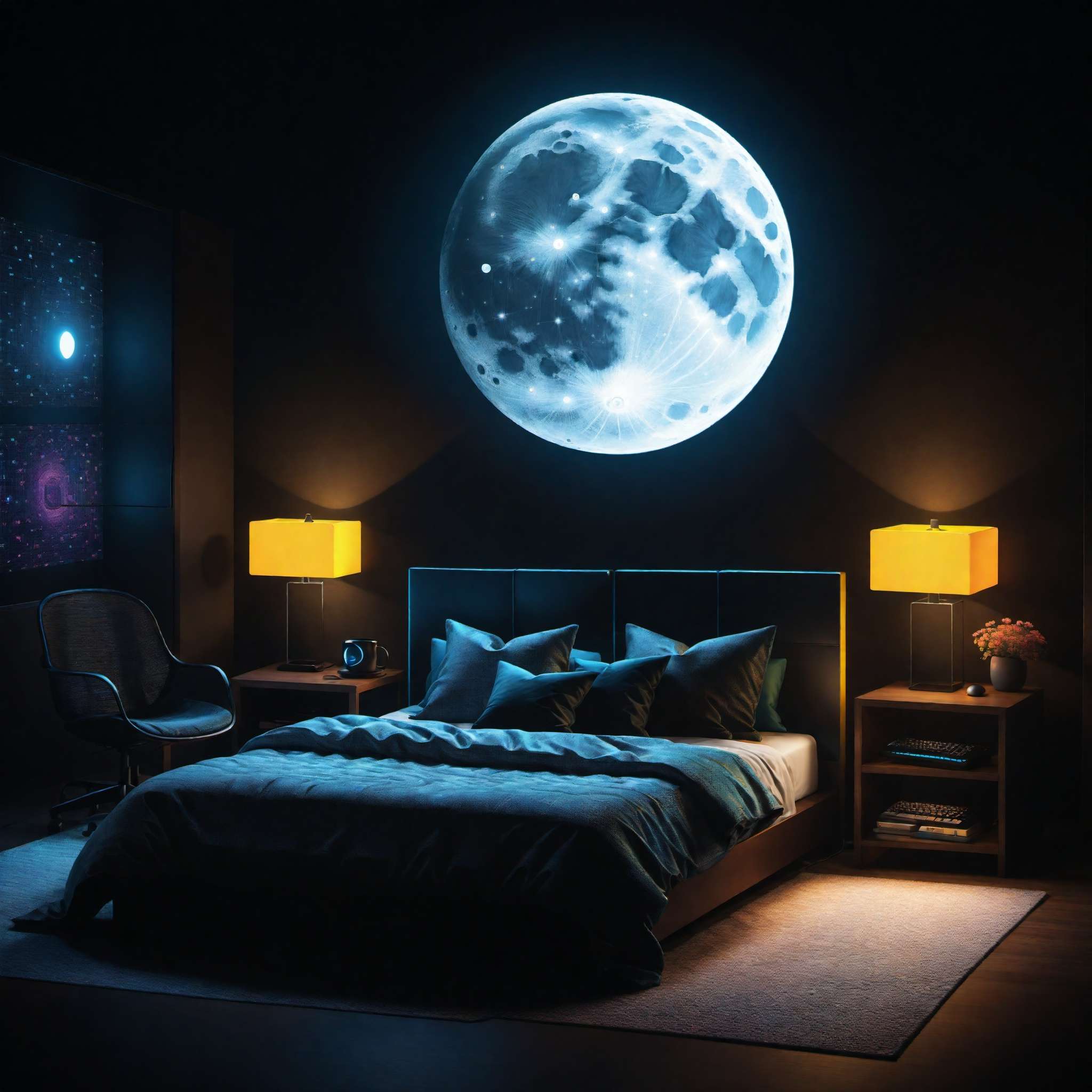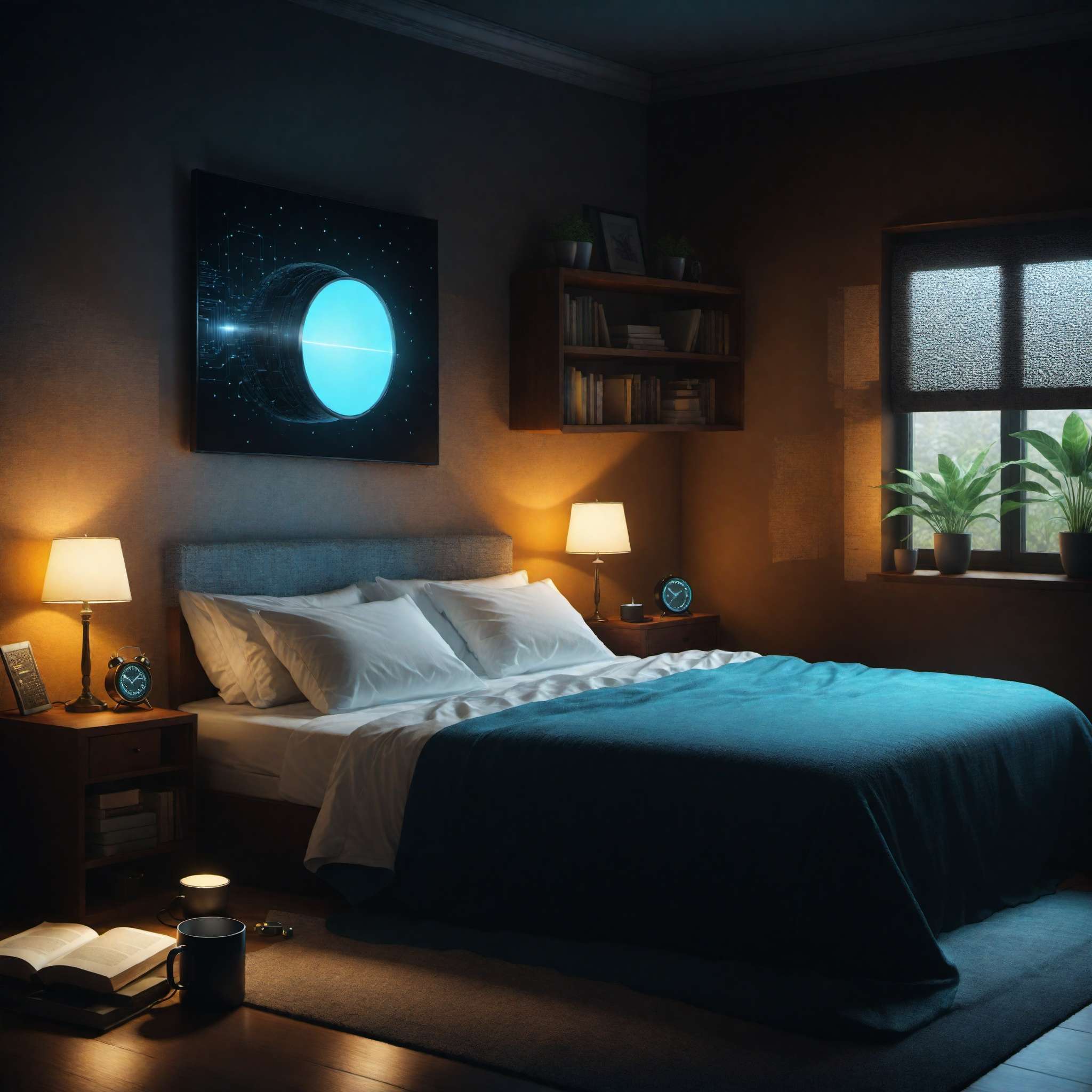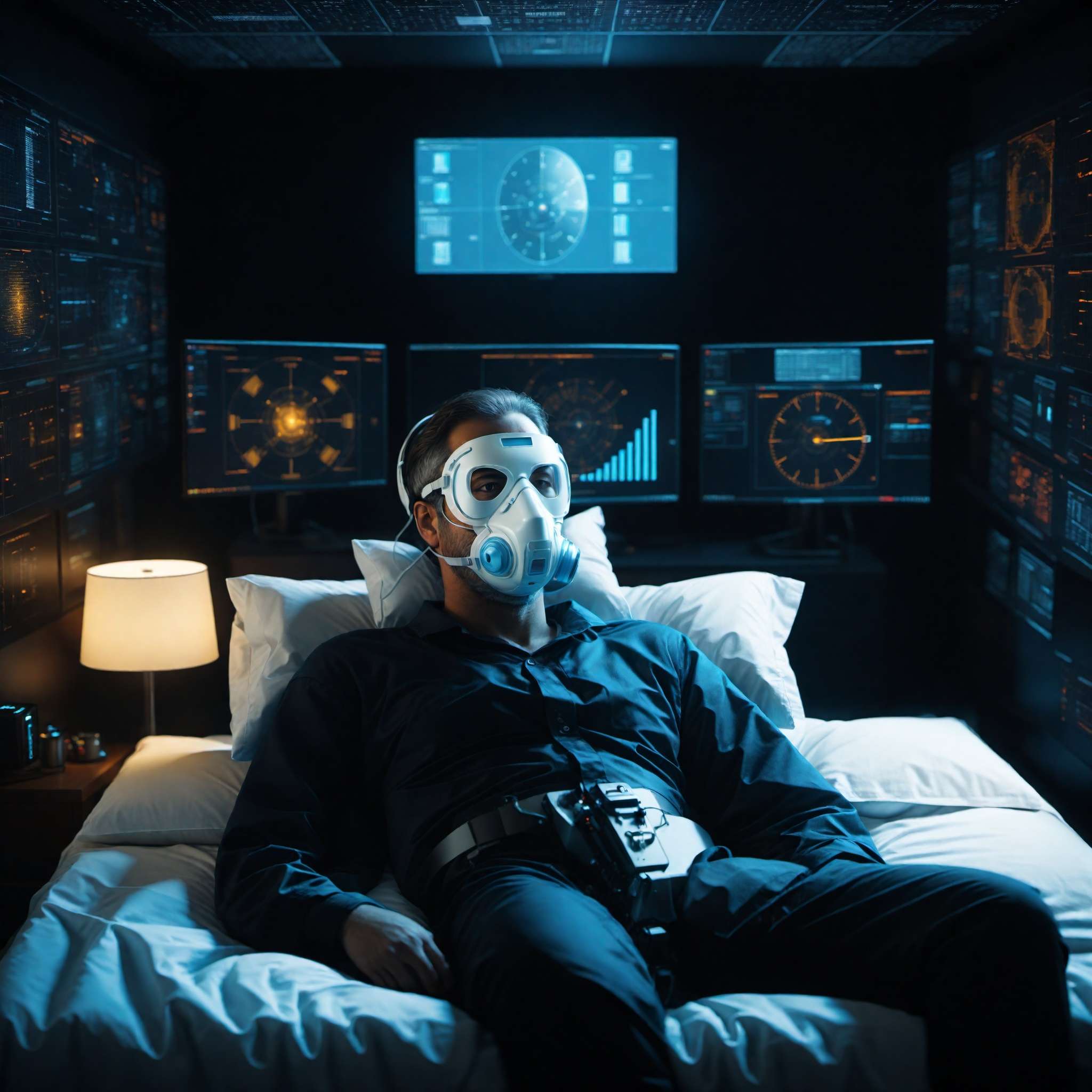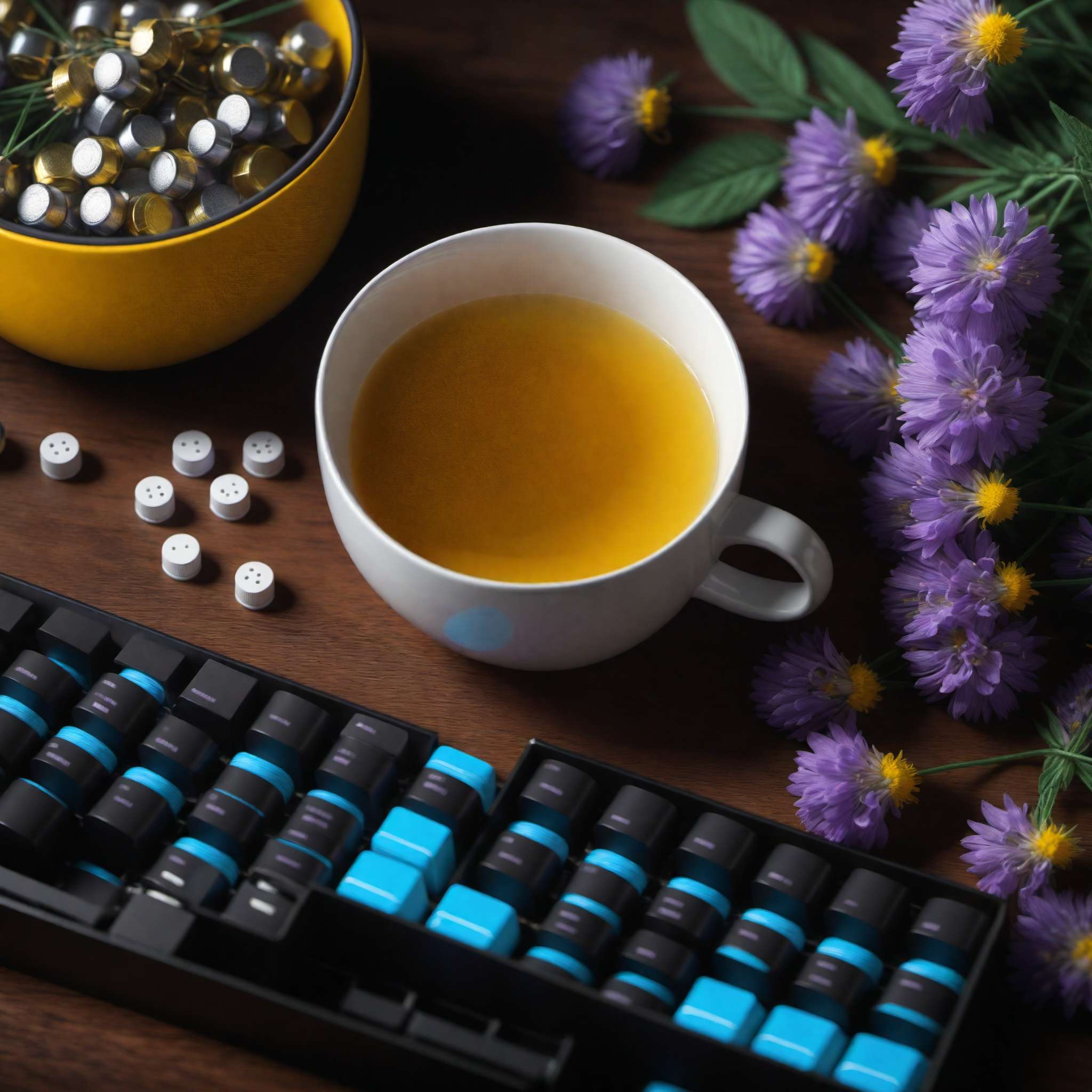Zombie Bunny is Reader-supported and may earn an affiliate commission through links on our site.

Hacking Your Sleep For A Restful Night
Improve your sleep quality with these effective life hacks. #SleepHacks #Wellness
Explore the science of sleep and learn practical techniques to enhance its quality in our comprehensive guide to sleep hacking. Discover how factors like stress, diet, and environment impact your sleep, and how you can leverage technology for better rest. Understand common sleep disorders and when to seek professional help. From maintaining good sleep hygiene to using natural sleep aids responsibly, this blog is a roadmap to better sleep, equipping you with the knowledge and tools to sleep your way to improved health and well-being. Start today and embark on a journey to a restful night and a healthier life.
Introduction: The Importance of Restful Sleep

© Copyright , ZombieBunny.Org
Why is restful sleep important?
Sleep, often taken for granted, is an essential component of human health and well-being. Restful sleep not only rejuvenates the body but plays a critical role in various facets of our physical and mental health. It helps in healing and repair of heart and blood vessels, supports growth and development, boosts immunity, and aids in maintaining a healthy balance of hormones that regulate hunger and satiety.
On the mental front, quality sleep is integral for cognitive functions like learning, memory, and problem-solving skills. It helps in managing mood, reducing stress, and promoting emotional well-being. Research also suggests a link between deficient or disturbed sleep and an increased risk of chronic health problems like obesity, diabetes, cardiovascular diseases, and even depression. Therefore, prioritizing restful sleep is key to enhancing overall health and productivity.
What is sleep hacking?
Sleep hacking, a term gaining popularity in the wellness sphere, refers to the adoption of strategies and practices aimed at optimizing sleep quality and efficiency. The objective is not merely to increase the number of sleeping hours but to enhance the effectiveness of the sleep we get. Sleep hackers delve into understanding their sleep patterns, the science of circadian rhythm, and the stages of sleep to make the most out of their rest time.
The concept of sleep hacking encompasses a wide array of tactics – from creating a sleep-conducive environment, adapting a balanced diet and regular exercise, to leveraging technology for sleep tracking and resorting to natural sleep aids. It also involves addressing sleep disorders and practicing good sleep hygiene. Sleep hacking is about personalizing these strategies to fit individual needs and lifestyles. With a rise in sleep disorders and increasing awareness about the importance of restful sleep, sleep hacking provides a proactive approach to achieving better health and well-being.
What this blog covers about sleep hacking
This blog is your comprehensive guide to hacking your sleep for a restful night. We delve into the intricacies of the sleep cycle, helping you understand its stages and the role of the circadian rhythm in regulating sleep. We discuss the profound impact of diet and exercise on sleep quality, providing insights into sleep-promoting foods and the best time to exercise for optimal sleep.
The blog also includes a section on creating the perfect sleep environment and offers an overview of the latest sleep tech gadgets and apps. For those struggling with sleep disorders, we shed light on common symptoms and treatment options. We also lay out the principles of sleep hygiene and explore the world of natural sleep aids and supplements. With each topic, we provide practical tips and hacks that you can incorporate into your daily routine to enhance sleep quality. This blog is a roadmap to better sleep, equipping you with the knowledge and tools to sleep your way to improved health and well-being.
Understanding Your Sleep Cycle

© Copyright , ZombieBunny.Org
What is a sleep cycle and why does it matter?
A sleep cycle is a natural rhythm of the body that regulates our sleep and wakefulness. Typically lasting about 90 minutes, each cycle consists of several stages including light sleep, deep sleep, and Rapid Eye Movement (REM) sleep. Each stage of the cycle plays a crucial role in maintaining mental and physical health.
Understanding your sleep cycle is integral to sleep hacking as it provides insights into the quality of your sleep. Light sleep is the initial stage which is relatively easy to disrupt. Deep sleep, on the other hand, is the most restorative stage where the body repairs and rejuvenates itself. REM sleep is when most dreaming occurs and it plays a vital role in memory consolidation and learning. Disruptions to this cycle can lead to poor sleep quality and associated health issues. By understanding the sleep cycle, you can adopt strategies to ensure you cycle through all stages effectively, leading to a restful night’s sleep.
The stages of sleep
Sleep is not a uniform state of rest, but a dynamic process that involves a progression through different stages. These stages are usually categorized into non-rapid eye movement (NREM) and rapid eye movement (REM) sleep.
NREM sleep consists of three stages. The first stage is light sleep, occurring as you transition from wakefulness to sleep. This is followed by the second stage, also a form of light sleep, but characterized by slower brain waves with occasional bursts of rapid waves. The third stage, known as deep sleep or slow-wave sleep, is the most restorative stage where various physiological processes such as tissue repair, bone and muscle growth, and immune function reinforcement take place.
Following the NREM stages, we enter REM sleep, often associated with intense brain activity, rapid eye movements, and vivid dreams. This stage is crucial for memory consolidation and learning. Each sleep cycle begins with NREM sleep and ends with REM sleep, with the entire cycle repeating approximately every 90 minutes. Achieving a balanced progression through these stages is key to experiencing a restful and refreshing sleep.
Understanding circadian rhythm
The circadian rhythm, often referred to as the body’s internal clock, is a natural system that regulates sleep-wake cycles over a 24-hour period. Governed by the suprachiasmatic nucleus in the brain, it’s influenced by environmental cues, primarily light and darkness. During the day, exposure to light signals the brain to promote wakefulness. As darkness falls, the brain induces the production of melatonin, a hormone that prepares the body for sleep.
Understanding your circadian rhythm is instrumental in sleep hacking as it allows you to align your sleep patterns with your natural biological rhythms. Disruptions to the circadian rhythm, such as those caused by shift work or jet lag, can lead to sleep disorders and various health issues including cardiovascular disease, obesity, and mood disorders.
By synchronizing your activities with your circadian rhythm, you can enhance sleep quality, improve daytime alertness, and boost overall health. This could involve exposing yourself to natural light during the day, maintaining consistent sleep and wake times, and creating a dark and quiet sleep environment at night. In essence, respecting your circadian rhythm is a critical step towards achieving restful and rejuvenating sleep.
The Role of Diet in Restful Sleep

© Copyright , ZombieBunny.Org
The link between diet and sleep
Diet and sleep share a reciprocal relationship, each influencing the other in significant ways. Certain foods and beverages can directly impact sleep quality, while irregular sleep patterns can affect your dietary choices and metabolism.
Nutrients in your diet can influence sleep parameters. For instance, foods rich in tryptophan, an amino acid, can aid in the production of serotonin and melatonin, hormones essential for sleep regulation. Complex carbohydrates can increase the availability of tryptophan in the bloodstream, promoting better sleep. On the other hand, high-fat diets might disrupt the circadian rhythm, leading to poor sleep.
Caffeine and alcohol, while often used as stimulant and relaxant respectively, can interfere with the sleep cycle. Caffeine can delay the timing of the body clock and reduce the total amount of sleep, while alcohol might disrupt the second half of the sleep period, leading to fragmented sleep.
Moreover, research has found a connection between irregular sleep patterns and unhealthy dietary patterns, including higher intake of calories and lower intake of fruits and vegetables. Understanding the interplay between diet and sleep can thus be instrumental in enhancing sleep quality and overall well-being.
Sleep-promoting foods
Certain foods can contribute to a restful night’s sleep due to their nutrient compositions. Foods rich in tryptophan, magnesium, calcium, and B vitamins can promote better sleep as they aid in the production of sleep-regulating hormones like serotonin and melatonin.
Many types of fish, including salmon, tuna, and trout, are high in vitamin B6, which is needed to make melatonin. Dairy products like milk, cheese, and yogurt contain tryptophan and calcium, which also promote the production of melatonin. Whole grains are rich in magnesium, a mineral often lacking in many diets, and deficiency of which can hinder deep sleep.
Fruits such as bananas, cherries, and kiwi have been shown to improve sleep quality. Bananas are an excellent source of magnesium and potassium, both of which are natural muscle relaxants. Cherries, especially tart cherries, are one of the few natural food sources of melatonin. Kiwis are rich in serotonin and antioxidants, both of which may improve sleep quality when eaten before bed.
Nuts and seeds, including almonds, walnuts, pistachios, flax seeds, pumpkin seeds, and sunflower seeds, are also sleep-promoting foods due to their high content of tryptophan, magnesium, and melatonin. Including these foods in your daily diet can help you optimize your sleep patterns and improve sleep quality.
Foods to avoid for better sleep
While some foods aid in promoting better sleep, others can disrupt your sleep cycle and should be avoided, especially close to bedtime. Certain foods and beverages can interfere with the body’s natural sleep-inducing processes, leading to restlessness or difficulty falling asleep.
Caffeinated drinks like coffee, energy drinks, and certain types of tea can stimulate the nervous system and prevent your body from naturally relaxing at night. Even decaffeinated coffee contains small amounts of caffeine that can disrupt sleep in sensitive individuals.
Alcohol, despite its initial sleep-inducing effect, can interfere with the sleep cycle, particularly the REM stage, resulting in fragmented sleep. Spicy foods can cause heartburn or indigestion, making it difficult to sleep. Foods high in fat can also disrupt your sleep as they take longer to digest and can cause discomfort.
Sugary foods and refined carbs can trigger wakefulness at night and pull you out of the deep, restful stages of sleep. Eating a large meal close to bedtime can also lead to poor sleep, as your body has to work hard to digest the food.
Incorporating a well-balanced diet and being mindful of your food and beverage intake, especially in the hours leading up to sleep, can significantly improve your sleep quality and overall health.
Exercise and Sleep Quality

© Copyright , ZombieBunny.Org
How does exercise improve sleep quality?
Physical activity is a potent sleep enhancer, with several mechanisms contributing to its sleep-promoting effects. Regular exercise can help you fall asleep faster, spend more time in deep sleep, and wake up less often during the night, thus improving overall sleep quality.
Exercise aids in the promotion of sleep by affecting body temperature. Post-exercise drop in body temperature can promote falling asleep. Moreover, exercise can help reset the sleep-wake cycle by raising body temperature a little, allowing it to drop and trigger feelings of drowsiness around bedtime.
Physical activity also reduces insomnia by decreasing arousal, anxiety and depressive symptoms. It increases the production of serotonin in the brain and decreases levels of cortisol, the body’s stress hormone, creating an ideal biochemical environment for sleep.
Furthermore, regular exercise can help manage sleep disorders such as sleep apnea and restless legs syndrome. Importantly, the benefits of exercise extend beyond just sleep. Regular physical activity improves your mood, increases energy levels, and contributes to better health overall.
It’s worth noting that the timing of exercise can affect individual sleep patterns. While morning exercise can help kickstart the day with a boost of energy, afternoon exercise can help deepen sleep. Tailoring exercise type and timing to personal preferences and lifestyle can maximize its sleep-enhancing benefits.
Best time to exercise for optimal sleep
The timing of exercise can significantly impact sleep patterns and the quality of rest you get at night. While the best time to exercise can vary among individuals based on their circadian rhythm or personal schedule, there are general guidelines that can be beneficial for most people.
Morning exercise, particularly exposure to natural light during a morning workout, can help reinforce your body’s sleep-wake cycle, enhancing sleep quality. It can also help increase alertness and energy levels throughout the day.
Afternoon exercise, especially between 1 p.m. and 4 p.m., can also be beneficial. It can help avoid the drowsy period after lunch and can also help deepen sleep as body temperature drops post-exercise closer to bedtime.
However, high-intensity exercise should generally be avoided in the late evening or just before bed. While some people may not experience any sleep disturbances, others may find it harder to fall asleep as exercise can stimulate the heart, brain, and muscles, and also raise body temperature, which can interfere with the body’s natural wind-down process.
In conclusion, while these guidelines can serve as a starting point, it’s essential to listen to your body. Noting how your body responds to exercise at different times of the day and observing any subsequent impact on sleep can help you determine the best workout schedule for optimal sleep.
Exercise routines to promote restful sleep
To enhance sleep quality and duration, it’s beneficial to incorporate a mix of aerobic exercises, strength training, and mind-body exercises into your fitness routine.
Aerobic exercises, also known as cardio, such as walking, running, swimming, or cycling, can help decrease the time it takes to fall asleep and increase the duration of sleep. They help reduce anxiety and depressive symptoms, common culprits of sleep problems, and improve sleep quality by increasing the amount of deep, restorative sleep.
Strength training, involving resistance exercises and weightlifting, can also contribute to better sleep. Regular resistance training can help reduce symptoms of insomnia and sleep apnea, and improve sleep quality and efficiency.
Mind-body exercises like yoga and tai chi are renowned for reducing stress and promoting relaxation. These exercises involve slow, controlled movements and deep-breathing techniques that can help ease the transition into sleep. Pilates, a low-impact flexibility and muscular strength and endurance movements, can also be beneficial for sleep.
Lastly, stretching, particularly before bedtime, can help alleviate muscle tension and promote a state of relaxation, aiding the transition into sleep.
Remember, consistency is key. Even moderate exercise of around 30 minutes a day, most days of the week, can noticeably improve sleep quality. However, it’s always important to listen to your body and adjust your exercise routine as needed to avoid overtraining, which can negatively affect sleep.
Creating a Sleep-Conducive Environment

© Copyright , ZombieBunny.Org
The importance of a sleep-conducive environment
Creating a sleep-conducive environment is crucial for achieving restful sleep. Your surroundings can significantly impact your ability to fall asleep and cycle through the stages of sleep efficiently. Various environmental factors, such as light, temperature, noise, and your mattress and bedding, can either aid or hinder sleep.
Light plays a significant role in regulating sleep-wake cycles. Exposure to artificial light after sunset can suppress the production of melatonin, the hormone that signals your body it’s time to sleep. Therefore, it’s essential to use dim lighting in the evening and maintain a dark environment in your bedroom.
The temperature of your sleep environment can also affect sleep quality. A cooler room, around 60-67 degrees Fahrenheit, is generally better for sleep. A room that’s too hot or too cold can disrupt your body’s internal temperature regulation, leading to restless sleep.
Noise can be a significant sleep disruptor, causing you to wake up and making it hard to fall back asleep. Using white noise machines, earplugs, or noise-cancelling headphones can help create a quiet sleep environment.
Lastly, your bed should be comfortable and supportive. The quality of your mattress and pillows, as well as the feel of your sheets and blankets, can greatly impact your sleep experience. Investing in good quality bedding that suits your comfort preference can significantly improve your sleep quality.
Tips to create the perfect sleep environment
Creating the perfect sleep environment involves a few practical adjustments to your bedroom setup that can significantly enhance sleep quality. Here are some tips to help set the stage for a restful night’s sleep.
Keep your bedroom dark. Use heavy curtains or shades to block light from windows, or try a sleep mask. Also, consider removing electronic devices that emit light.
Keep the room cool. As mentioned, a slightly cool room is better for sleep. Experiment with different temperatures to find what works best for you.
Make your bedroom quiet. Consider using earplugs, a fan, or a white noise machine to mask external noises. If you can’t control the noise in your environment, soothing sounds or sleep soundtracks may help.
Invest in a comfortable mattress and pillows. Make sure your mattress is supportive and comfortable. Your pillows should also support your neck and align with your sleep position.
Opt for calming colors. Consider painting your room in soothing shades that promote relaxation and sleep.
Keep your room clean and clutter-free. A clean, organized room can help create a calming environment conducive to sleep.
Finally, reserve your bed for sleep and intimacy only. This can strengthen the mental association between your bed and sleep.
Remember, what works best can vary among individuals. Feel free to experiment with different setups and find the perfect sleep environment that works for you.
Role of noise, light, and temperature in sleep quality
Noise, light, and temperature play pivotal roles in determining the quality of sleep. They can either promote a restful night’s sleep or interfere with it, based on how they are managed in your sleep environment.
Noise, particularly intermittent or sudden noise, can cause sleep fragmentation, leading to poor sleep quality and daytime sleepiness. Constant, ambient noise, like white noise or fan noise, on the other hand, can help mask disruptive external sounds and promote better sleep.
Light directly influences the production of melatonin, the hormone that regulates sleep-wake cycles. Exposure to natural light during the day can help maintain a healthy sleep-wake cycle. However, exposure to artificial light in the evening and nighttime, especially blue light from electronic devices, can suppress melatonin production and disrupt sleep. Therefore, controlling light exposure is crucial for good sleep.
Temperature plays a significant role in sleep quality as well. As your body prepares for sleep, there’s a natural drop in core body temperature. A cooler bedroom environment, typically around 60-67 degrees Fahrenheit, can facilitate this process and make it easier to fall asleep. A room that’s too hot or too cold can disrupt this temperature regulation, leading to restless or fragmented sleep.
In essence, understanding and managing the roles of noise, light, and temperature in your sleep environment can significantly enhance sleep quality, helping you wake up refreshed and rejuvenated.
Technological Aids for Better Sleep

© Copyright , ZombieBunny.Org
How technology can enhance sleep quality
The advent of technology has brought about several tools that can enhance sleep quality. From sleep trackers and smart beds to white noise machines and light therapy lamps, there’s a plethora of tech gadgets designed to help you optimize your sleep.
Sleep trackers, available in the form of wearable devices or smartphone apps, can monitor your sleep patterns, measuring the total sleep time, sleep stages, and interruptions in sleep. This data can provide insights into your sleep quality and help identify potential sleep issues.
Smart beds and mattresses come with features like sleep tracking, temperature regulation, and adjustable firmness, all designed to provide a personalized sleep experience.
White noise machines can generate soothing sounds that mask external noises, creating a quiet environment conducive to sleep. They can be particularly helpful for people who live in noisy environments or have difficulty falling asleep.
Light therapy lamps can be used to regulate your sleep-wake cycle, especially for people suffering from seasonal affective disorder (SAD) or jet lag. These lamps mimic outdoor light, helping adjust your body’s internal clock.
Sleep-promoting apps offer a range of features including guided sleep meditations, bedtime stories, and calming music, all designed to help you relax and fall asleep.
While these technological aids can enhance sleep quality, it’s important to note that they should complement, not replace, good sleep hygiene practices. Incorporating these tools while maintaining a healthy sleep routine can lead to more restful nights and better overall health.
Best sleep tracking apps and how they work
Leveraging technology for better sleep, a plethora of sleep tracking apps have surfaced, promising to help users understand and improve their sleep patterns. Here are some top-rated sleep tracking apps and a brief overview of how they work.
Sleep Cycle is a popular app that analyzes your sleep patterns and wakes you up during your lightest sleep phase to ensure you wake up feeling well-rested. It uses sound analysis to identify sleep states by tracking movements in bed.
SleepScore uses your smartphone’s microphone and speakers to track your sleep by sending out sound waves that bounce off your body and return to the phone. The app provides a comprehensive sleep report and personalized advice to improve your sleep.
Pillow is an iOS sleep tracker that monitors and analyzes your sleep patterns. It uses sound analysis and movement tracking to provide detailed sleep stage diagrams and sleep quality assessments.
Sleep as Android is a versatile app available on Android that tracks sleep using your phone’s or wearable’s sensors to monitor your movements and noise in your environment. It also features a smart alarm, lullabies, sleep talk recording, and more.
While sleep tracking apps provide valuable insights into your sleep patterns, they should not be used as a diagnostic tool for sleep disorders. For any sleep-related concerns, it’s always best to consult a healthcare professional. However, these apps can certainly aid in understanding your sleep patterns and guide you to improve your sleep hygiene.
Blue light and its effect on sleep
Blue light, a type of light with a short wavelength and high energy level, plays a significant role in regulating our sleep-wake cycle, or circadian rhythm. While natural exposure to blue light during daylight hours helps maintain a healthy circadian rhythm, exposure to this light type in the evening can have disruptive effects on sleep.
The primary source of blue light in our environment is sunlight. However, many electronics with digital screens, like smartphones, tablets, computers, and televisions, also emit high amounts of blue light. Exposure to these devices in the evening can trick our brains into thinking it’s still daytime, reducing the production of melatonin, a hormone that controls your sleep-wake cycle. This suppression of melatonin can make it harder to fall and stay asleep.
Moreover, studies have shown that prolonged exposure to blue light can cause digital eyestrain and can potentially harm our eyes over time.
To mitigate the impact of blue light on sleep, consider establishing a digital curfew, avoiding screens for at least one hour before bed. Alternatively, you can make use of blue light blocking glasses or install apps and software that reduce or filter out blue light on your devices in the evening. By managing our exposure to blue light, we can maintain our natural sleep cycle and improve overall sleep quality.
Understanding Sleep Disorders

© Copyright , ZombieBunny.Org
Common sleep disorders and their symptoms
Sleep disorders are conditions that disrupt your normal sleep patterns, leading to poor sleep quality, daytime sleepiness, and a range of other symptoms. Here are some common sleep disorders and their symptoms.
Insomnia is the inability to fall asleep or stay asleep. Symptoms include difficulty falling asleep, waking up during the night, waking up too early, feeling tired upon waking, daytime tiredness, irritability, and difficulty focusing.
Sleep apnea is characterized by pauses in breathing or periods of shallow breathing during sleep. Symptoms include loud snoring, episodes of stopped breathing during sleep witnessed by another person, abrupt awakenings followed by gasping or choking, waking up with a dry mouth or sore throat, morning headache, and difficulty staying asleep.
Restless legs syndrome (RLS) is a neurological disorder characterized by an uncontrollable urge to move the legs. Symptoms include uncomfortable sensations in the legs with a compulsion to move them, relief with movement, and worsening of symptoms at rest or in the evening and nighttime.
Narcolepsy is a neurological disorder that affects the control of sleep and wakefulness. Symptoms include excessive daytime sleepiness, sleep paralysis, hallucinations, and episodes of cataplexy (partial or total loss of muscle control, often triggered by strong emotions).
If you suspect you have a sleep disorder, it’s essential to consult a healthcare professional for diagnosis and treatment. Treatment can greatly improve your sleep and overall quality of life.
When to seek professional help
While occasional sleep disturbances are common, consistent sleep problems can significantly impact your quality of life and may indicate a sleep disorder. It’s important to recognize when professional help is needed to address these issues.
If you consistently find it hard to fall asleep, stay asleep, or wake up feeling unrefreshed, it may be time to seek professional help. Other signs include feeling tired or sleepy during the day, having difficulty concentrating, feeling irritable or experiencing mood changes, and depending on caffeinated beverages to stay awake.
Also, if you’ve tried implementing good sleep hygiene practices and they haven’t improved your sleep, it would be worth discussing your sleep issues with a healthcare professional. Similarly, if you have been using over-the-counter sleep aids for an extended period, it would be advisable to seek professional advice.
Sleep-related symptoms that require immediate attention include loud snoring accompanied by pauses in breathing, gasping for breath during sleep, feeling the irresistible urge to move your legs at rest, or experiencing episodes of sudden muscle weakness when expressing strong emotions.
Remember, sleep disorders are treatable, and professional help can significantly improve your sleep quality, overall health, and quality of life. Don’t hesitate to reach out to a healthcare provider if you’re experiencing persistent sleep problems. They can help identify any underlying issues and provide appropriate treatment options.
Treatment options for sleep disorders
Treatment options for sleep disorders can vary widely depending on the type and severity of the disorder. The primary goal of treatment is to restore regular sleep patterns and improve overall health and quality of life.
For insomnia, cognitive-behavioral therapy (CBT) is often the first line of treatment. CBT for insomnia targets the thoughts and actions that can disrupt sleep and teaches relaxation techniques and sleep hygiene practices. In some cases, short-term use of prescription medications may be recommended.
Sleep apnea is commonly treated with lifestyle changes such as weight loss, quitting smoking, and avoiding alcohol. Continuous positive airway pressure (CPAP) therapy, where a machine provides a steady air pressure to keep your airways open during sleep, is also commonly used.
Restless legs syndrome may be managed with certain lifestyle changes and medications. Regular exercise, maintaining a regular sleep routine, and reducing caffeine, alcohol, and tobacco can help manage symptoms. Medications used to treat Parkinson’s disease, epilepsy, and nerve pain can also be effective.
Narcolepsy treatment often involves medications that help manage symptoms. Stimulants can help manage excessive daytime sleepiness, while certain antidepressants can help alleviate cataplexy, sleep paralysis, and hallucinations.
It’s important to remember that treatment should be personalized to the individual, taking into account the type and severity of the disorder, the individual’s age, health, and personal preferences. With appropriate treatment, most people with sleep disorders can experience improved sleep and a better quality of life.
Sleep Hygiene: Practices for Better Sleep

© Copyright , ZombieBunny.Org
What is sleep hygiene and why is it important?
Sleep hygiene refers to a variety of practices and habits that are necessary to have good nighttime sleep quality and full daytime alertness. Just as personal hygiene is fundamental to good physical health, sleep hygiene is crucial for maintaining healthy sleep and overall well-being.
One of the most important sleep hygiene practices is to spend an appropriate amount of time asleep in bed, not too little or too excessive. Sleep needs vary across ages and are especially impacted by lifestyle and health.
Establishing a regular sleep schedule by going to bed and waking up at the same time each day, even on weekends, can significantly improve sleep quality. This helps regulate your body’s internal clock and could help you fall asleep and stay asleep for the night.
Creating a sleep-conducive environment that is dark, quiet, comfortable, and cool can also greatly enhance sleep quality. Furthermore, limiting exposure to light in the evenings and managing worries or stress before bedtime can make it easier to fall asleep.
Good sleep hygiene also involves paying attention to what you eat and drink, and being physically active. Avoiding large meals, caffeine, and alcohol close to bedtime, and incorporating physical activity into your daily routine can promote better sleep.
Maintaining good sleep hygiene can significantly improve your quality of sleep, boost your health, and enhance your overall quality of life.
Best sleep hygiene practices
Adopting good sleep hygiene practices can significantly improve sleep quality and overall health. Here are some of the best sleep hygiene practices you can incorporate into your routine.
Maintaining a regular sleep schedule is one of the most effective sleep hygiene practices. Try to go to bed and wake up at the same time every day, even on weekends. This can help regulate your body’s internal clock and make it easier to fall asleep at night.
Creating a restful environment is also crucial. Keep your bedroom quiet, dark, and cool. Consider using earplugs, an eye shade, a white noise machine, or a humidifier.
Pay attention to what you eat and drink. Don’t go to bed either hungry or stuffed, particularly avoid heavy or large meals within a couple of hours of bedtime. Nicotine, caffeine and alcohol can also disrupt sleep.
Incorporate physical activity into your daily routine. Regular physical activity can help you fall asleep faster and enjoy deeper sleep.
Manage stress. When you have too much to do and too much to think about, your sleep is likely to suffer. Consider healthy ways to manage stress, such as getting organized, prioritizing tasks, and utilizing relaxation techniques.
Finally, it’s important to recognize that everyone is different. What works best for you might not work as well for someone else. The key is to experiment with different strategies and find what helps you achieve a good night’s sleep.
The impact of stress on sleep
Stress and sleep have a complex relationship. Stress can significantly impact the quality of sleep, and poor sleep, in turn, can exacerbate stress and its related symptoms.
Stress activates the body’s “fight or flight” response, leading to an increased state of alertness and arousal. This can make it difficult to fall asleep or maintain sleep. Stress can also interfere with the sleep cycle, reducing the amount of time spent in deep, restorative sleep, leading to feelings of restlessness upon waking.
Furthermore, stress can contribute to various sleep disorders, including insomnia, sleep apnea, and nightmares. People under stress often experience racing thoughts or worries that prevent them from falling asleep. Stress can also lead to behaviors that interfere with sleep, such as consuming excessive caffeine or alcohol.
Stress and sleep form a vicious cycle. Lack of sleep can heighten feelings of stress, anxiety, and irritability, making it harder to cope with day-to-day tasks. This can increase stress levels, leading to further sleep problems.
Fortunately, stress can be managed, and its impact on sleep can be reduced. Techniques such as cognitive-behavioral therapy, mindfulness meditation, physical activity, and maintaining good sleep hygiene can help manage stress and improve sleep quality. By addressing stress, an important sleep disruptor, one can significantly enhance the quality of their sleep and overall well-being.
Natural Sleep Aids and Supplements

© Copyright , ZombieBunny.Org
How natural sleep aids and supplements can help
In the quest for a good night’s sleep, many people turn to natural sleep aids and supplements. These can be a helpful tool to boost sleep quality and duration, especially when used in conjunction with good sleep hygiene practices.
Melatonin is one of the most well-known sleep supplements. It’s a hormone naturally produced by the body to regulate the sleep-wake cycle. Melatonin supplements can be particularly helpful for individuals dealing with jet lag or those who work night shifts.
Valerian root is a herbal supplement that has been used for centuries to treat insomnia. Some studies suggest it may help reduce the amount of time it takes to fall asleep and improve sleep quality.
Magnesium is a mineral involved in hundreds of bodily processes, including sleep. Magnesium deficiency has been linked to insomnia and other sleep disorders. Supplementing with magnesium can improve sleep quality, especially for those who have insomnia.
Lavender is a plant often used in essential oils and aromatherapy for its calming effects. Studies have shown that lavender can improve sleep quality and reduce anxiety.
While these natural sleep aids and supplements can be beneficial, it’s important to remember they are not a cure-all solution. It’s always recommended to consult with a healthcare provider before starting any new supplement regimen, as some can interact with medications or have side effects. Incorporating these aids along with maintaining good sleep hygiene can pave the way for better sleep.
Most effective natural sleep aids
The search for a good night’s sleep has led many to explore the world of natural sleep aids. Several herbs, supplements, and natural remedies have been used for centuries to promote sleep and relaxation. Here are some of the most effective natural sleep aids.
Melatonin is a hormone that your body naturally produces when it’s time to sleep. Melatonin supplements are widely used for various sleep conditions including insomnia, jet lag, and shift work disorder.
Valerian root is another popular herbal supplement. It’s often used for sleep disorders, particularly insomnia. Valerian seems to improve the speed of falling asleep, depth, and overall quality of sleep.
Chamomile, a well-known herbal tea, is another natural sleep aid. It’s reputed to have calming properties, and many people drink it in the evening to help relax and promote sleep.
Lavender is renowned for its calming and sedative effects. A few drops of lavender essential oil on your pillow or in a diffuser can help promote relaxation and improve sleep quality.
Magnesium, an essential nutrient, plays a key role in sleep. Studies have shown that magnesium can improve sleep quality, especially in those who have poor sleep.
While these natural sleep aids can be effective, it’s important to remember that they’re not a substitute for good sleep hygiene or a treatment for sleep disorders. Always consult with a healthcare provider before starting any new supplement regimen.
Precautions when using sleep aids and supplements
While natural sleep aids and supplements can be an effective way to enhance sleep quality, it’s important to exercise caution when using them. Here are some precautions to consider when using sleep aids and supplements.
Firstly, always consult with a healthcare provider before starting any new supplement regimen. This is particularly important if you’re already taking other medications, as some supplements can interact with certain medicines, potentially leading to adverse effects.
Secondly, remember that natural doesn’t always mean safe. Some natural sleep aids can have side effects, especially when taken in large doses or for a long period. For instance, long-term use of melatonin can lead to dependence, while excessive use of valerian root can cause headaches, dizziness, and stomach problems.
Thirdly, it’s important to use sleep aids and supplements as part of a broader sleep hygiene routine. They are not a substitute for maintaining healthy sleep habits, such as keeping a consistent sleep schedule, creating a restful sleep environment, and managing stress.
Lastly, be aware that sleep aids and supplements are not a cure for sleep disorders. If you’re experiencing persistent sleep problems, it’s essential to seek professional help. Sleep disorders can be a symptom of an underlying health issue, and treating the root cause is crucial for improving sleep.
With these precautions in mind, sleep aids and supplements can be an effective tool in promoting restful, quality sleep.
Conclusion: Embrace Better Sleep for a Healthier Life

© Copyright , ZombieBunny.Org
Recap of sleep hacking techniques
Embracing better sleep is a fundamental aspect of leading a healthier life. This journey begins by understanding the crucial role of sleep in overall well-being and recognizing the factors that can affect sleep quality. From the impact of noise, light, and temperature to the effects of stress and blue light exposure, being aware of these factors can set the stage for improved sleep.
Creating a sleep-conducive environment is another step towards achieving restful nights. This involves setting the right room temperature, ensuring darkness, and minimizing noise. Equipping your bedroom with the right mattress and pillows and keeping it clean and clutter-free can also enhance your sleep experience.
Harnessing the power of technology can further improve sleep quality. Sleep tracking apps, smart beds, and white noise machines are just a few examples of how technology can aid in better sleep. However, attention must be given to the potential disruptive effects of technology, such as the blue light emitted from screens.
Understanding sleep disorders, their symptoms, and when to seek professional help is also crucial. Recognizing the signs can lead to early intervention and treatment, minimizing the impact of these disorders on sleep and overall health.
Lastly, good sleep hygiene practices and natural sleep aids and supplements can play a significant role in enhancing sleep. From maintaining a regular sleep schedule to using melatonin or valerian root, these tools can support a healthy sleep routine. By implementing these sleep hacking techniques, you can pave the way for better sleep and a healthier life.
The benefits of restful sleep
Embracing better sleep reaps numerous health benefits. Restful sleep is not just about waking up feeling refreshed – it’s a critical component of overall health and well-being.
One of the primary benefits of restful sleep is improved cognitive function. Sleep plays a vital role in both learning and memory. Without adequate sleep, the brain struggles to concentrate, make decisions, and learn new things. Furthermore, sleep helps consolidate memories in the mind, enhancing your ability to recall information.
Good sleep also contributes to physical health. During sleep, the body works on healing and repairing cells, tissues, and organs. This restorative process boosts immunity, aids in muscle growth and repair, and supports heart and blood vessel health.
Restful sleep is also linked to better mood regulation. Lack of sleep can lead to mood swings, anxiety, and depression. On the other hand, adequate sleep can enhance emotional stability and resilience, leading to better overall mental health.
Moreover, quality sleep can boost productivity and performance, whether at work, school, or in daily tasks. It enhances problem-solving skills, creativity, and the ability to focus, leading to more accomplished days.
In conclusion, the benefits of restful sleep extend far beyond merely feeling alert and rested upon waking. It’s a vital part of maintaining health, enhancing quality of life, and ensuring optimal daily functioning. By embracing better sleep, you’re investing in a healthier, happier life.
Final thoughts on hacking your sleep for a restful night
Sleep is as vital to our health and well-being as food and water, yet many of us struggle to get enough of it. The good news is that by understanding the importance of sleep and taking proactive steps to improve it, we can enjoy a restful night’s sleep and reap the numerous benefits it brings.
Hacking your sleep for a restful night involves both understanding the science of sleep and implementing practical techniques. From maintaining good sleep hygiene and leveraging the right technology to understanding and managing sleep disorders, there are various ways to enhance sleep quality.
Natural sleep aids and supplements can also play a role in promoting restful sleep, but it’s important to remember that they should be used responsibly and in conjunction with other sleep-improving practices.
Remember, improving sleep is not an overnight task. It requires patience, consistency, and sometimes trial and error to find what works best for you. But the effort is worth it. Restful sleep can boost your mood, productivity, cognitive function, and overall health, enhancing your quality of life.
In the pursuit of better sleep, every step, no matter how small, counts. So start today, make sleep a priority, and embrace the journey to a restful night and healthier life.
Please support our site and purchase something from our store.







